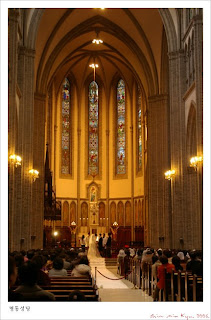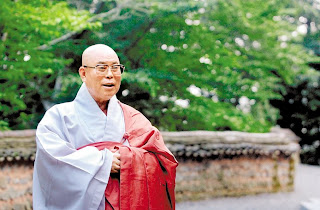0. pattern : ~이/가 있다 / 없다
1. Meaning
(1) ~이/가 있다 is standing for an existence expression like "There is/are ~."
(2) ~이/가 없다 means "There is/are not ~"
#. Sometimes, Korean people use 있다 like "have"
2. Example
(1) 책상이 있습니다. There is a desk.
(2) 펜이 있습니다. There is a pen.
(3) 컴퓨터가 있습니다. There is a computer.
(4) 커피가 있습니다. There is coffee.
(5) 돈이 있습니다. There is money or I have money.
3. What's "이/가"
이/가 is post-position which is following after Noun used as objective in sentences.
4. When should you put 이 or 가 after objective noun?
(1) As you can see 책상 on 2.(1) sentence, the last character is composed of three consonants and it's put "이." ; when the last character has three of consonants, you should put 이 on the sentences. 2.(2) and 2.(5) are also the same way.
(2) Otherwise, 2.(3), 2.(4) have "가" after the subjectives. the last character has only two consonants. So, you should put "가" on when there is the last character of the objective has two consonants.
5. Self-study
(1) 스피커(이/가) 있습니다. There are speakers.
(2) 시계(이/가) 있습니다. There is a watch.
(3) 선생님(이/가) 있습니다. There is a teacher.
(4) 자동차(이/가) 있습니다. There is a car.
(5) 지하철(이/가) 있습니다. There is subway.
(6) 버스(이/가) 있습니다. There is a bus.
(7) 택시(이/가) 있습니다. There is a taxi.
(8) 기차(이/가) 있습니다. There is a train.
(9) 콜라(이/가) 있습니다. There is coke.
(10) 사이다(이/가) 있습니다. There is cider.
6. Answer
(1) 가, (2) 가, (3) 이, (4) 가, (5) 이, (6) 가, (7)가, (8)가, (9)가, (10)가
7. What's difference of 있다 and 있습니다
있다 and 있습니다 have the same meaning standing for existence.
For listeners, however, you should speak differently.
있다 is informal for usual writing for oneself such as essay, diary, and etc. It's the basic form of verb. Normally, basic forms of verbs are shown as "~다"
있습니다 is extremely formal for the old, or in business situation shown as "~습니다."
있어요. is formal for everyone in speaking way as "어요/아요"
있어 is informal in speaking to your friends.
있다 < 있어 < 있어요 < 있습니다.
(informal)------------------------(formal)
ex> 돈이 있다. < 돈이 있어. < 돈이 있어요. < 돈이 있습니다.
8. Negative expression against "있다"
"없다" is the negative expression against "있다." It's also used the same way with 있다.
(1) 포도가 없습니다. There is not a grape.
(2) 사과가 없습니다. There is not an apple.
(3) 사람이 없습니다. There is not a person.
(4) 가방이 없습니다. There are not rice.
(5) 책이 없습니다. There is not a book.
9. Self-study
(1) 남자(이/가) 없습니다. There is no man.
(2) 철수(이/가) 없습니다. There is not Cheolsu.
(3) 종이(이/가) 없습니다. There are not papers.
(4) 지도(이/가) 없습니다. There is no map.
(5) 돈(이/가) 없습니다. I have no money.
10. Answers
(1) 가 (2) 가 (3) 가 (4) 가 (5) 이
------------------------------------------
11. Practice Patterns
(1)
Jack : 돈 있어요?
Sam : 아니요, 돈이 없어요 (No, I don't have money)
Jack : Sam은 돈이 없군요.
(2)
Sean : 콜라 있어요?
Dean : 아니요. 콜라 없어요. 사이다가 있어요.
Sean : 콜라는 없지만 사이다가 있군요.
(3)
Jing : 펜 있어요?
Lulu : 아니요. 가방이 있어요.
Jing : 펜은 없고 가방이 있군요.
----------------------------------
Words Check
책상
펜
컴퓨터
커피
돈
스피커
시계
선생님
자동자
지하철
버스
택시
기차
콜라
사이다
포도
사과
사람
가방
책
남자
종이
지도
돈
----------------------------------------
Key Sentence
(1) 돈이 있습니다.
(2) 돈이 없습니다.











